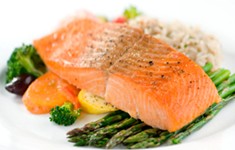
In general, sales of fresh fish are tipping slightly downward, but due to the French consumer's enduring appetite for fresh salmon, in the last 12 months up until the end August, sales of fresh fish rose by 3 percent. Fresh salmon now represents about a quarter of all fresh fish sales in France.
Salmon sales helped to bring fish sales ahead of other competing proteins. Fresh meat sales fell by 2 percent, and poultry consumption stabilized with the year-ending in August, according to FranceAgriMer.
But in terms of value, the average price of all fresh fish actually fell by 2 percent due to the significant 16 percent fall in the price of fresh salmon. The fall in salmon value negated the overall rise in price for all other fish species.
While whole fish sales continue to fall, pre-packed and filleted fish are an increasingly popular choice for French consumers. In 2012, a considerable 68 percent of all fresh fish was sold in pre-packed portions, compared to 63 percent in 2003.
Increased fresh seafood prices are “playing a role in the slowing down of consumption,” according to France AgriMer. Fresh bivalve sales fell by 2 percent, 9 percent for scallops and cephalopods, and 11 percent for crustaceans.
Deli products, by comparison, have suffered less, with only a light 1 percent fall in consumption over the past year.
Ready-prepared seafood recorded a healthy 4 percent hike in volume sales. A further bright spot is frozen breaded fish, which saw sales rising by 3 percent.
By contrast, frozen and canned seafood witnessed a downturn in consumption.
"We continue to note that the consumer is increasingly moving toward processed products," writes the government food agency.
Between 2003 and 2011, the deli slice of the market rose by nearly 10 percent, moving from 18 percent to 27 percent. This growth has largely to the detriment of fresh seafood, whose share has shrunk from 40 percent to 35 percent.
French exports of aquatic products (not including tuna, feed and oils) fell 2 percent in volume in the last 12 months to September. The average export price rose by 5 percent for the majority of products, equating to a 3 percent rise in value for exports.
And in the 12 months up until the end of August this year, imports of aquatic products (not including tuna, feed and oils) fell by 2 percent in volume. However the average price of products rose by 2 percent, enabling the total value of imports to remain stable.





